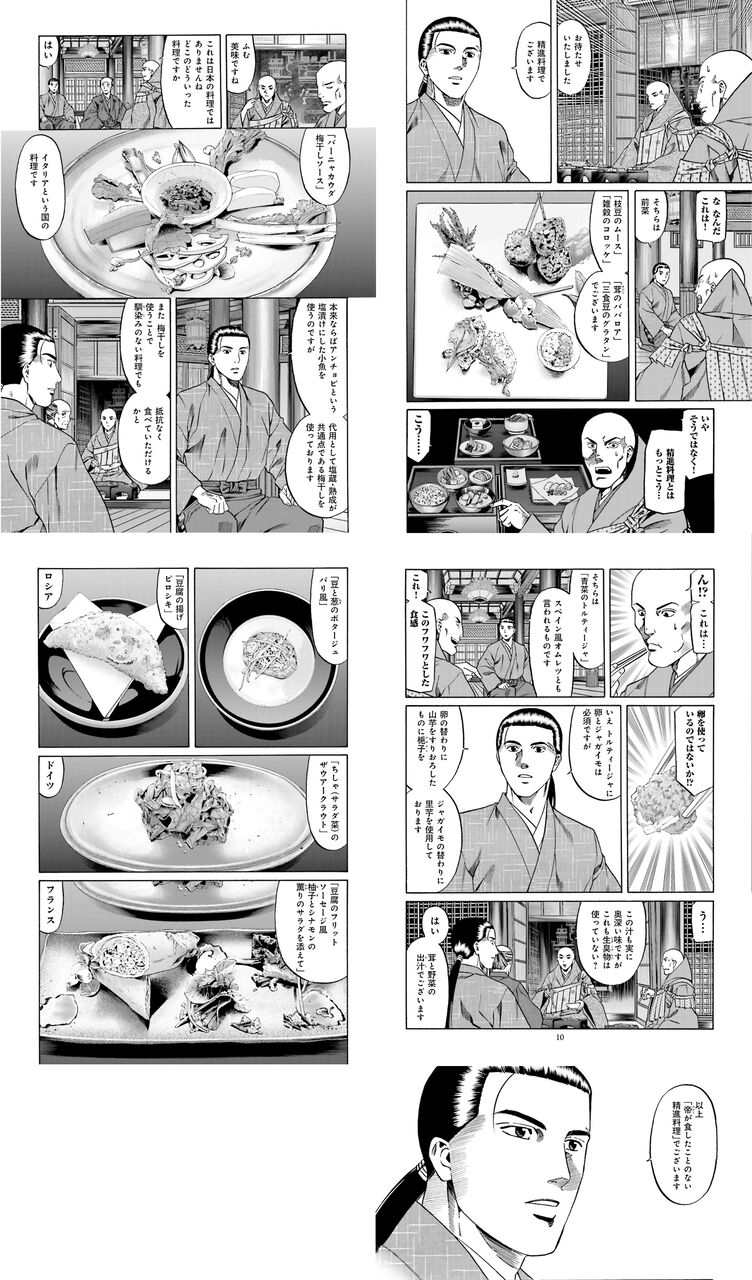
How do you know what the texture of an egg is like?
>>1
You must have eaten before entering the monkhood, right?
More like… like this…
It’s too fishy to pass the top green onion without being able to specifically talk about vegetarian cuisine.
Prohibiting the five pungent vegetables might be a harder restriction than banning meat and fish.
I wonder how popular eggs were as food during the Sengoku period.
I have heard that there were times in the Edo period when they did eat it.
Wasn’t Kyonyo relatively lenient?
“It’s okay at our place, but since it’s made with the expectation of serving the emperor, it should follow the format of vegetarian cuisine.”
Don’t only talk about the manga based on the pages that have been posted.
This doesn’t prohibit fishy items, but it’s just a condition that it’s better not to have since it’s a temple. So if someone is saying anything about green onions, it’s just because they’re not reading.
Is green onion not okay…? Is the Buddhist door a cat…?
I have tried to impose restrictions on myself whenever possible, but I was such a man with an overly broad range of knowledge that it made no sense at all.
Garlic’s effect on libido is somewhat imaginable.
From there, it’s a serious matter that all kinds of green onions are no good.
If Ken were to be reincarnated in modern times, I think he would definitely be unstoppable.
Ken has too broad a knowledge of cooking.
If it’s this guy, getting five stars is a piece of cake.
I wonder if the eggs from this era are chicken eggs.
I feel like there was a scene in the story where they were collecting duck eggs.
In modern times, it’s common to have nutritious foods, so it’s hard to realize, but onions and similar vegetables are also quite like aphrodisiacs or doping substances.
In the past, when sugar was like an aphrodisiac, it was common to have insufficient nutrition, and taking in nutrients would make people aggressive.
Since childhood, eating sugar and green onions is common, so it’s advantageous to have built up a tolerance in modern times.
Instead, in modern times, if there is even a little deficiency, it becomes unbearable.
There are rules for slightly enthusiastic laypeople, rules for general monks, and rules for extreme practitioners.
I think the story in the old tales about gaining strength from eating mochi is due to the chronic lack of sugar, making it a common state of not being able to exert strength, so mochi and white rice work effectively.
In such times, sugar, green onions, and green tea can give you a high like drugs.
Beef is also a medicine.
Interestingly, in modern times, there are people who, in their attempt to lose weight, do not get enough nutrition.
A nameless person sent to train as a monk at Mount Koya.
I remember a story about a colleague getting yelled at for bringing chili pepper in.
In modern times, trying to practice self-discipline makes it quite a hard mode where you can’t eat store-bought hamburgers or curry.
I wonder why shojin ryori (Buddhist vegetarian cuisine) is prohibited?
A kind of thinking that opposes luxury?
There is a difference between vegetarians and vegans when it comes to eggs.
Is it because wild garlic was something that monks who couldn’t eat garlic would eat instead?
More like… if it’s this colorless, dull, and so bland that it steals the will to live, and the texture is crumbly…
It’s impressive how smoothly they deal with it without getting caught up in the Spanish-style omelet.
How can you make something so extensive?
Is it okay to use green onions?
![[Manga] The magic trick that everyone tried to master as kids but couldn’t is trending, lol.](https://otaku-reviews.net/wp-content/uploads/2025/06/bf53dd2f.jpg)
![[Manga Time Kirara] Tell me your favorite couple in Kirara.](https://otaku-reviews.net/wp-content/uploads/2025/06/7f363a8b.jpg)
![[Gundam GQuuuuuuX] Even though you’re a Newtype, you’re so insensitive, Egusabe-kun.](https://otaku-reviews.net/wp-content/uploads/2025/06/b96ae33d.jpg)
![[Rune Factory] I’m sorry, but I live behind the general shrine.](https://otaku-reviews.net/wp-content/uploads/2025/06/af0f4933.jpg)
![[Fullmetal Alchemist] I have no certainty, but I feel like Envy is the weakest among the homunculi.](https://otaku-reviews.net/wp-content/uploads/2025/06/da613d5c.png)
![[Thunder thunder thunder] I thought this cover was sexy… so I bought it, and it turned out to be more interesting than I expected.](https://otaku-reviews.net/wp-content/uploads/2025/06/d303d5fc.jpg)